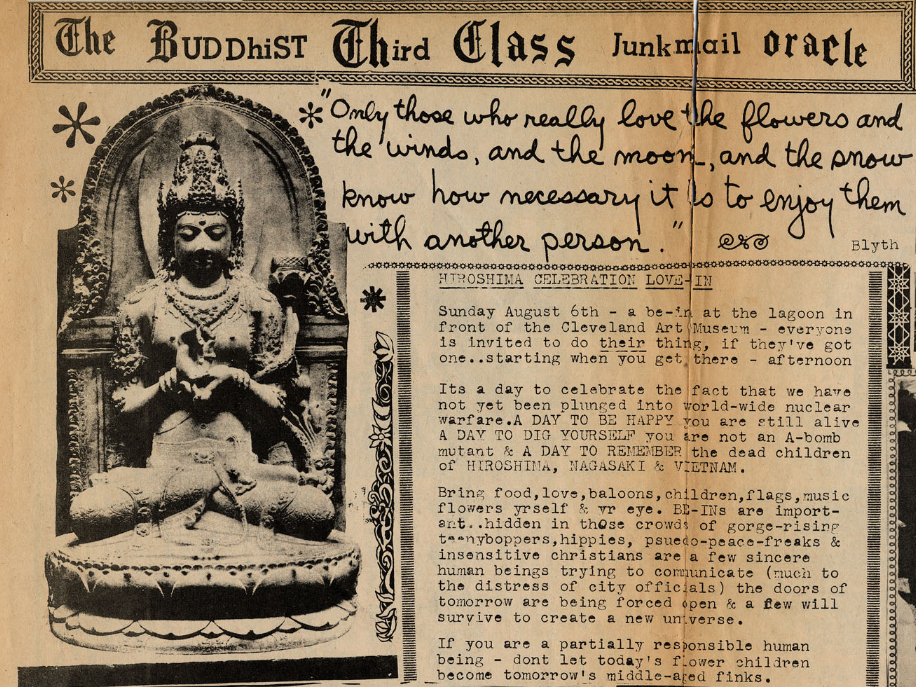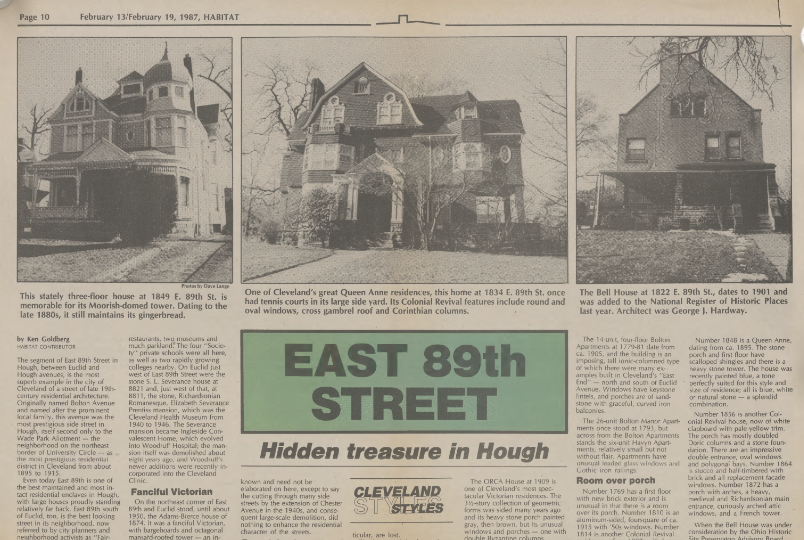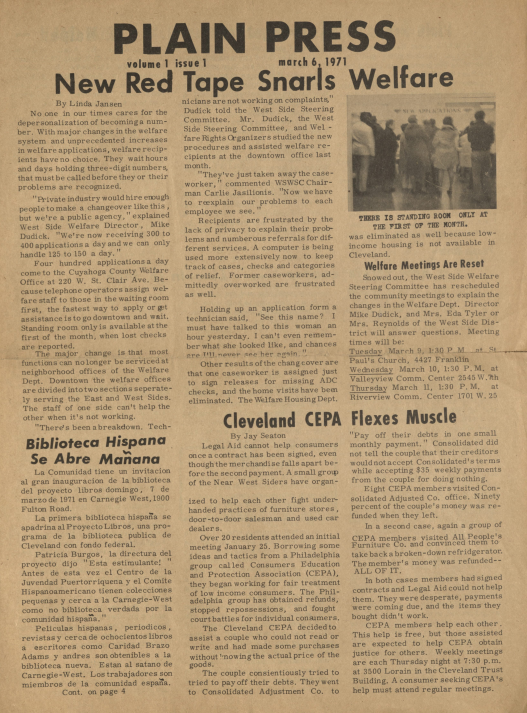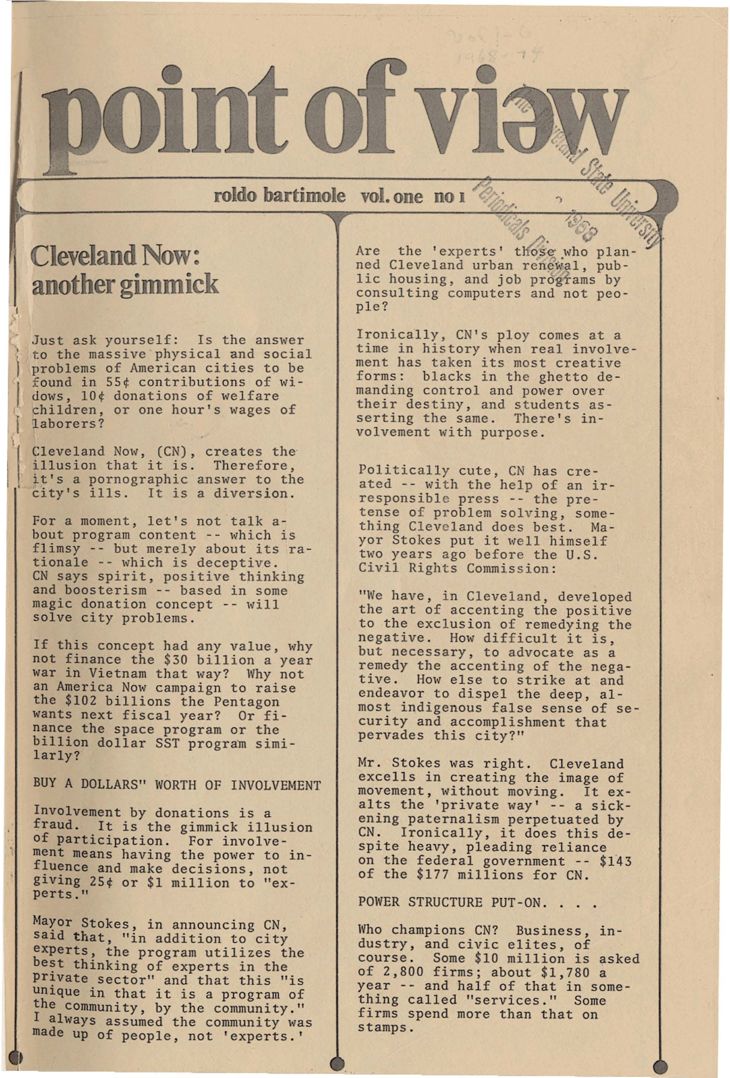Independent, Community, & Citizen Journalism

Preserving Cleveland's Independent Voices
No discussion of the journalism in this city would be complete without mention of Cleveland's fierce tradition of independent, community, and citizen journalism. Hundreds of these grassroots publications, as diverse as the city itself, have emerged over the years to reflect the views and express the concerns of virtually every segment of our citizenry. Their topics range from politics and social commentary to architecture, poetry, religion, and neighborhood news.
This sampling of digitized material - a tiny fraction of our print collection - is as varied and as quirky as their creators. We have chosen not to limit the material featured here to the traditional broadsheets, newspapers, and mimeographed newsletters that have served as outlets for civic engagement since the city's founding, but to expand our offerings to include current platforms and media which have enabled this vital form of expression to flourish into the 21st century.
The Buddhist Third Class Junkmail Oracle
The Marrahwana Quarterly
The Buddhist Third Class Junkmail Oracle - 24 issues
The Marrahwana Quarterly - 11 issues
Poet, artist and publisher, d.a. levy was an important literary and underground figure in Cleveland's emerging poetry and small/alternative press scene in the early 1960s and continued to be until his untimely death in 1968. As the self-publishing and mimeograph revolution of the 1960s era unfolded, levy documented his love-hate relationship with the city and with the politics of the day through poetry and art which today provides a unique political and social perspective of 1960s Cleveland.
Both the Buddhist Third Class Junkmail Oracle and The Marrahwannah Quarterly were published from 1967 until levy's death in 1968. Buddhist Third Class Junkmail Oracle was later published by Angry City Press, ceasing publication in 1969.
- The d a levy Collection - A portal to works by and about Cleveland poet d.a. levy. The collection includes a digital gallery of CSU's levy collection of poetry, artwork, newspapers, manuscript and media materials, photographs and other related ephemera along with links to bibliographies and additional resources about levy.
The City Club of Cleveland
 Incorporated in 1912, the City Club of Cleveland is the oldest continuous free speech forum in the United States, renowned for its tradition of debate and discussion. As part of its mission to "to inform, connect, and motivate citizens to take action on issues relevant to our region and beyond," the City Club holds a weekly forum series where speakers are invited to discuss major issues that affect American life. Hundreds of distinguished speakers have presented at the City Club over the years including politicians, labor and business leaders, scientists, social activists, educators, clergy and entertainers.
Incorporated in 1912, the City Club of Cleveland is the oldest continuous free speech forum in the United States, renowned for its tradition of debate and discussion. As part of its mission to "to inform, connect, and motivate citizens to take action on issues relevant to our region and beyond," the City Club holds a weekly forum series where speakers are invited to discuss major issues that affect American life. Hundreds of distinguished speakers have presented at the City Club over the years including politicians, labor and business leaders, scientists, social activists, educators, clergy and entertainers.
The City Club Forums Collection, located in Special Collections at the Michael Schwartz Library at Cleveland State University, contains over 2,200 audio recordings and 1,917 video recordings of these speeches, including the question and answer sessions that followed. With the support of the City Club of Cleveland, the Michael Schwartz Library has digitized and preserved these recordings for generations to come. Many speeches are now available in streaming format.
- The City Club Forums Collection - Streaming audio and video recordings of the City Clubs' weekly forums
- City Club photos - From Cleveland Memory
Habitat "Cleveland Styles" columns
93 articles on Cleveland architectural design & history
Through most of the 1980s, Douthit Communications of Sandusky, OH, published a weekly newspaper called Habitat. Focused on the real estate community, every issue of the paper contained a section on architectural design and history (residential and commercial) in Northeast Ohio. Written primarily by Ken Goldberg, architectural historian, and Carol Poh Miller, historian and preservationist, these articles offer a unique view of the area’s built environment. Since the pieces were created some four decades ago, the issues they raise are somewhat of a historical snapshot. However, as an architectural record of Cleveland structures, they are largely timeless.
The Plain Press
PDFs of historical issues, 1971-1975
PDFs of current issues
The Plain Press is a neighborhood newspaper which has served the near west side since March, 1971. Originally edited by Linda Jansen and dependent primarily on volunteer help, the tabloid's name was an amalgam of the Plain Dealer and the Cleveland Press), for a “down-to-earth newspaper to which any neighborhood resident could relate.”
Early coverage championed the powerless and underprivileged, featuring community issues including health care, housing, gentrification, police brutality, poverty and personal stories of its working class readers. Editor David Beach, on the paper's 20th anniversary, recalls:
"...the Plain Press has somehow kept on publishing with its many volunteers and dedicated staff members who always pay the printer before themselves. It's more than a business. It's a community institution— a lovable old car that neighborhood residents keep patching together with bondo and duct tape.
"Sometimes we would pass out the paper to people waiting in cheese lines...By the end of distribution I'd be exhausted and smeared with ink. But I also would be joyful. I would feel part of something very special — an urban community full of people who, faced with hard times, were still caring for their fellow human beings, still dreaming and working to build better neighborhoods. These people were the true heroes of the 1980s. They never gave up. And neither has the Plain Press".
Plain Press is now located across the street from their original location in the back of Six Steps Down Bookstore on W. 25 St. in Ohio City. Supported by grants, donations, and advertisements, the free paper is still distributed monthly throughout the Brooklyn Centre, Clark-Fulton, Cudell, Detroit-Shoreway, Edgewater, Ohio City, Stockyards, Tremont, Westown and West Boulevard neighborhoods.
Cleveland Memory has archived a few dozen early issues of the Plain Press, from volume 1, issue 1, dated March 1971, through 1975.
Point of View
PDFs of 32 years - 675 issues - of Roldo's biweekly newsletter in their entirety
Published by Roldo Bartimole between the years 1968 (v.1) and 2000 (v. 33), this courageous publication examined the power structure in Cleveland, exposing the control of the city's agenda by the wealthy elite to the detriment of its working-class and poor residents. Professional journalist turned pioneering citizen journalist, Roldo Bartimole continues to speak truth to power. Although the final issue of Point of View - volume 33, no. 5 - appeared in December, 2000, he has continue his work .
Don't miss Roldo Bartimole: A Modern-Day Muckraker - a comprehensive site on his life and career
Cleveland Memory has digitized all of Bartimole's prodigious and indispensable output: all 32+ years of his biweekly Point of View newsletter, together with 222 columns for the Cleveland Edition, and 519 Free Times columns, together and searchable at last. We include a selection of published pieces about Roldo from sources ranging from the Columbia Journalism Review to Cleveland's Scene Magazine, as well as a finding aid to print materials in our Special Collections here at the Michael Schwartz Library CSU, encompassing more than 60 boxes of Roldo's notes, personal papers, correspondence, and ephemera, dating from 1960-2010.
Independent, Community, & Citizen Journalism:
Print Collections Housed in Special Collections of the Michael Schwartz Library at Cleveland State Universiy
THE LEO JEFFRES COMMUNITY NEWSPAPER COLLECTION
Finding aid for the Leo Jeffres Collection
The Leo Jeffres Community Newspaper Collection contains local newspapers, magazines, and other media from Cleveland-area neighborhoods, suburbs, and ethnic communities representing a variety of interests and topics. The original collection dates from c.1970-2014, but as local periodicals continue to be created and donated, they have been added and interfiled with the original collection.
The scope of this print collection is tremendous, ranging from the Penny Press (1881-1885) to the Great Swamp Erie da da BOOM (1971-1972), to the Homeless Grapevine (1993-2009), and represent many Cleveland metropolitan neighborhoods, ethnic communities, and topics of interest both urban and suburban, including:
- 17 African-American publications, 1986-2010
- 12 Native American, Arab-American, and Asian-American publications, 1988-2011
- 20+ European-American publications,
- 19 Latino Publications, 1997-2012
- Dozens of neighborhood, suburban, and college newspapers
- Dozens of music, sports, political, literary, business, religious, recovery, countercultural, and trade publications
- Dozens of publications covering LGBT, women's, senior citizens', family and parenting issues
ABOUT LEO JEFFRES
Leo Jeffres was a professor in the Communications Department at Cleveland State University from 1975-2011. Some of his interests include the effects of media and communication systems in society. He is the author of the books Urban Communication Systems: Neighborhoods and the Search for Community and Mass Media Effects; and co-author of Grassroots Journalism in the City: Cleveland's Neighborhood Newspapers..
Jeffres describes the significance of these communication systems as follows:
"Cities are more than just context - they should be the targets of our efforts to understand how communication connects people to each other and facilitates their 'search for community.' While many have abandoned exploring the geographic city in favor of virtual networks, the physical city continues to be relevant to people's search for meaning in life. We need to understand how a city's 'communication capital' is linked to civic engagement and a healthy public life. That means researching and understanding the processes of interpersonal, mediated, and organizational communication that are important for urban planning, public debate, and problem-solving in all types of cities and cultures.
"I've spent a good portion of my professional life examining grassroots newspapers, communication in ethnic groups, neighborhood networks, and civic engagement. Sometimes the themes have changed as the environment evolves, but the goal of trying to develop communication theories and methodological tools for describing and understanding community remains."
True to the spirit of Leo Jeffres' commitment to preserving these voices, we have continued to add community newspapers to his collection as they are donated.







